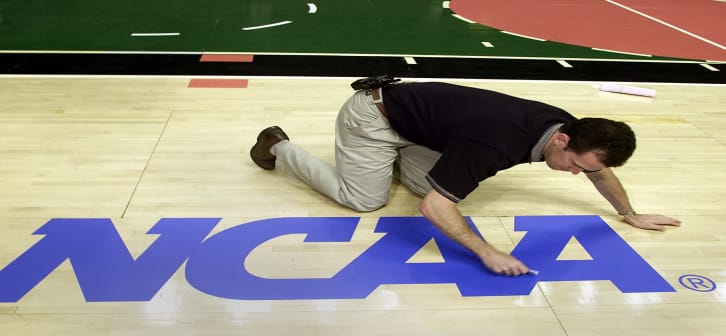NCAA to Study Impact of Name, Image, Likeness Policy on College Athletes
Writer
Editor & Writer
Writer
Editor & Writer

- The NIL policy was implemented in 2021 — college athletes can profit off their own fame.
- The NCAA will study what impact the policy is having on Division I college athletes.
- A preliminary report is expected by April, with a final report issued in June.
The NCAA announced that it will study the impacts of its new name, image, and likeness policy on Division I student-athletes' school choice, transfer opportunities, academics, and mental health.
The decision to study the organization's NIL policies was made Feb. 18 during a virtual meeting of the NCAA's Division I Board of Directors. A preliminary report is expected by April with a final report, including recommendations for possible action, expected in June.
The board of directors wants to preserve the positive aspects of the new policy while reviewing whether anything can be done to mitigate the negative ones, Board Chair Jere Morehead, president at the University of Georgia, said in a statement.
"We are concerned that some activity in the name, image and likeness space may not only be violating NCAA recruiting rules, particularly those prohibiting booster involvement, but also may be impacting the student-athlete experience negatively in some ways," he said.
The NCAA implemented its new NIL policies in July 2021, making it possible for college athletes to profit off their fame. The new policies touched off a frenzy of activity by athletes, schools, and businesses.
The NCAA implemented its new NIL policies in July 2021, making it possible for college athletes to profit off their fame. The new policies touched off a frenzy of activity by athletes, schools, and businesses.
The NCAA said involvement of schools in arranging deals was a concern, along with how to best ensure adequate representation for student-athletes as they negotiate contract terms. The association said that its national office enforcement staff is currently investigating violations of its rules, especially pay-for-play and recruiting inducements. No further details were provided.
"We expect that all members and their representatives are abiding by current NCAA rules regarding recruiting and pay-for-play, which are in place to support student-athletes," NCAA President Mark Emmert said. "We encourage school compliance staff to continue their diligence, and NCAA enforcement has and will continue to undertake investigations and actions against potential rules violations."
The NCAA repeated its call for Congress to establish a national NIL standard. There are currently seven bills awaiting congressional action. In the absence of a federal standard, 28 states have passed NIL legislation, each with slightly varying requirements.
Most universities and conferences now permit NIL deals. But the number of NIL deals and their total value is unknown since there is no public clearinghouse that tracks activity.
Also, most colleges have declined to release information, although Ohio State University shared a report on Feb. 10 that said 220 athletes had been paid a total of $2.98 million for 608 NIL deals since July 1. Boosters also have become involved, soliciting donations to attract and support athletes with apartments, cars, and more.
Latest News
Related Stories
Featured Stories
Latest Analysis
College Accreditation Is Changing. Here’s What Students Need To Know.

11 Red States Are Suing to Block Biden's SAVE Loan Repayment Plan. Here's What Borrowers Need to Know.

Here's Where the 2024 Presidential Candidates Stand on Higher Education

College Admissions, Student Diversity, and Campus Culture 50 Years Ago













